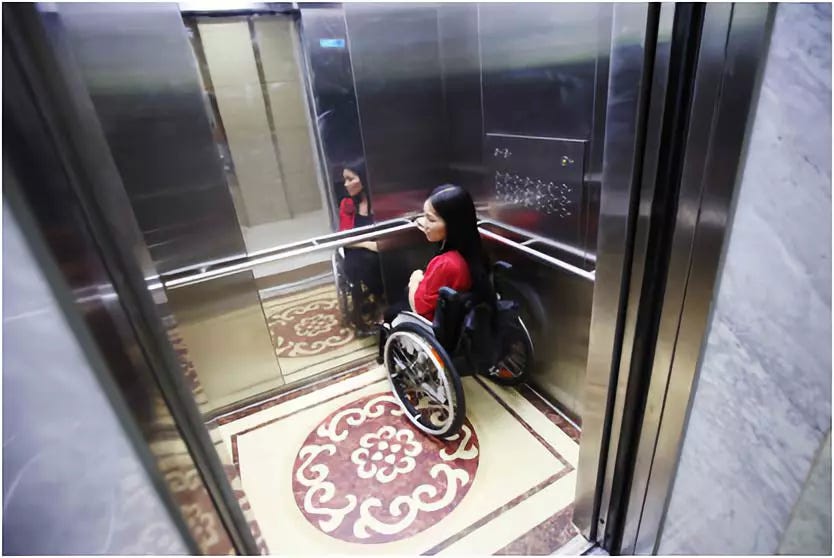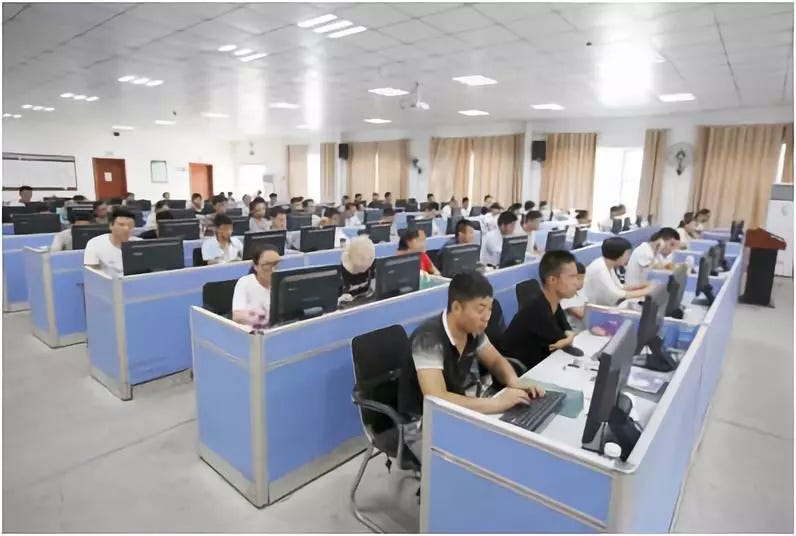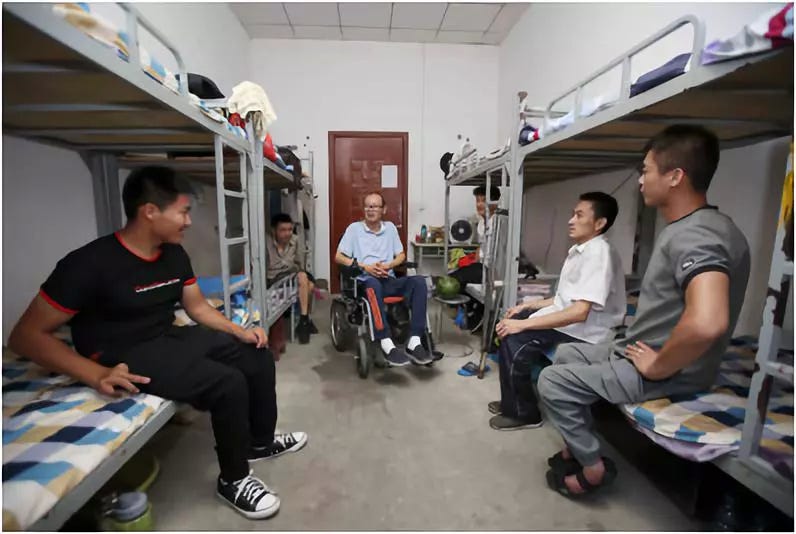
Greetings from Chinarrative!
In this issue, our single, longread investigates the lives of disabled customer services representatives who work for e-commerce giant Alibaba’s Taobao platform. The story was first published in September in Renwu, a leading nonfiction platform in China.
While the piece does contain some glowing references to the company, founder Jack Ma, and its Singles’ Day mega shopping festival, that doesn’t change the facts nor the essence of the subjects’ stories, and the piece offers rare insight into the plight of China’s disabled poor.
Father Was His Gentlest On Road to Orphanage

Liu Xiang takes the elevator at the headquarters of the Henan Disabled Persons' Federation in July 2018. Courtesy Renwu.
After some basic washing up in the morning, Liu Xiang donned a red jacket and rolled her wheelchair into the sunlit corridor.
Polio had completely distorted her spine into an “S” shape. Her bladder was also damaged. Even sitting still for an extended period was very painful. But as far as Liu Xiang was concerned, the moment she pushed through those doors and entered the computer-filled office of Taobao online customer service representatives, she was no longer the least fortunate person in the room.
Alibaba set up an online customer service operation for its Taobao website in 2010 with an eye toward providing part-time employment for university students. But soon executives noticed that the physically disabled faced an uphill challenge landing jobs and so they expanded their recruitment.
Liu Xiang’s colleagues started filing in. They were collectively known as the “special” online reps. One had suffered major burns and another could only maneuver two of his fingers. A third colleague couldn’t lift his arms and could only type by cradling his keyboard in his lap. A fourth lost his arms in an accident and typed with his feet.
Pleasantries were exchanged, followed by the sound of typing. Liu Xiang turned on her computer, logged in and clicked on a flashing window to type her opening greeting:
“How do you do, dear? Happy to be at your service.”
Human Waste
Born in Xinyang Village in Henan province, Liu Xiang contracted polio when she was 3. Her legs started shriveling like dying branches. Soon she could only wiggle on the ground by latching onto a small stool.
When she was old enough to understand speech, she once overheard an elder in the family tell her father: “Her legs are immobile. All you have to do is fill up a basin, dunk her in the water and press her head down…”
Her father didn’t take the advice, but his disgust grew by the day. Liu Xiang was followed by another girl and her mother was chronically ill. The immense pressure turned her father, who was kind by nature, into a tyrant. Liu Xiang was called a “cripple” who drew a tongue lashing for merely making a sound, saying:
I was either being beaten or scolded all the time.
The year Liu Xiang turned 9, her father decided to give her up for adoption, so he could get government approval to have another child.
On a dark night, Liu Xiang’s father carried her on his back and took her for an extended trek in the mountains. He said he was taking her somewhere that was better than home. She could even get an education there.
Liu Xiang’s father was unusually tender during the trek. Lying on her father’s back, Liu Xiang felt a sense of security she had never experienced before. Her father whispered:
Are you sleepy? If you are, go ahead and take a nap.
The “better place” turned out to be an orphanage.
After her father abandoned her, he told his fellow villagers that the “cripple” had died. After spending several months at the orphanage, she was returned to her parents when local police intervened.
Somehow Liu Xiang survived until her 16th birthday, when she left her village for the first time. Her family used their savings to buy her an electric tricycle, so she could become a cabbie in a neighboring town.
The city was another form of torture. Her fellow cabbies were mostly healthy and able men. They could help their passengers with their luggage and open doors for them—tasks that were impossible for Liu Xiang. She was frequently bullied. Some fellow cabbies tried to steal customers from her by standing next to her tricycle.
Back then there were few disabled-friendly facilities in the city. Liu Xiang had no choice but to visit the bathroom once in the morning and once in the evening. The practice took its toll on her bladder over the years, eventually leading to incontinence. She has worn adult diapers since then.
Even scam artists who staged fake accidents liked to target her. The worst case was when a repeat offender rammed into Liu Xiang’s tricycle on purpose and faked a seizure. He demanded 1,000 yuan (around $144). Liu Xiang, 16 at the time, was a greenhorn and thought she had actually injured someone. She was terrified. Thankfully, sympathetic onlookers helped talk the scam artist down. Liu Xiang eventually paid out some 500 yuan, a month of her earnings.
Liu Xiang’s marriage didn’t fare much better. When she was 20, a matchmaker introduced her to her husband, a man with an amputated left leg 17 years her senior. Liu Xiang never fantasized about genuine romance. “I knew what I had to offer, so I didn’t go there,” she said. The couple married 13 days after they first met.
After their wedding, Liu Xiang realized her husband was a gambling addict, even betting away their welfare payments. Liu Xiang could only raise her daughter on her meager earnings from tricycle cabbing.
At age 26, Liu Xiang gave birth to her second daughter. She had no choice but to bring her two kids to work. Her older daughter sat in her back seat while she simply tied her younger daughter to her body with a scarf.
There’s Always Worse
Just as Liu Xiang’s life was poised for a downward spiral, a friend who worked at the local disabled persons’ federation told her that there was a training center for those with disabilities at the provincial capital of Zhengzhou that prepared students for careers as Alibaba customer service reps. You could even work from home, the friend said. Liu Xiang was skeptical but decided to check it out.

Dozens of disabled workers attend a training session for aspiring Alibaba online customer service reps at a facility in Zhengzhou's Zhongmou County. Courtesy Renwu.
Wang Shaojun, the founder of the training center, was also disabled. He was diagnosed with fibula muscular atrophy when he was 17. This is a progressive illness that gradually shuts down motor function, saying:
Last year I could still cut my fingernails. This year, I can’t use my right hand to cut the fingernails on my left hand.
Wang Shaojun became a successful businessman, but there was nothing he could do about his crippling disease. He tossed and turned the night his son was born and resolved to do “something meaningful” so his son would be proud of his father when he grew up.
First, Wang Shaojun set up an online forum for the disabled. In 2008, due to his charitable efforts, he took part in the torch relay for the Beijing Olympics. In 2015, Alibaba and the disabled persons’ federation in Henan set up a program that placed the disabled in online customer service positions. Wang Shaojun realized that was right up his alley, so he built a training center on a 7.2-hectare garden he owned and started offering free tuition for disabled job seekers.
The “special” customer service reps performed similar duties to regular representatives. They mainly assisted Taobao members with tasks like how to obtain refunds to how to set up an online shop. But unbeknownst to the customer, their service rep might be typing with a single finger or his or her toes. Even though that was a challenge, it was still easier and more comfortable than other types of physical labor, so the job was popular among people with disabilities.
Liu Xiang was illiterate and didn’t know how to use a computer, but she wanted to become an Alibaba online customer service rep badly. That way she could work at home and take care of her two daughters at the same time. She could give up being a tricycle cabbie.
Wang Shaojun remembered the look on Liu Xiang’s face when she first arrived at the training center. She was filled with self-doubt, overwhelmed by everything. Wang Shaojun encouraged her to focus on her training first and not worry about anything else.
After settling down at the training center, Liu Xiang soon realized that she had so many kindred spirits.
Twenty-eight-year-old Zhang Huanhuan from Kaifeng was also a polio patient. She had been wandering the streets for the past decade, a victim of abuse and exploitation.
Thirty-two-year-old Guo Hui from Shangqiu had suffered burns to 95 percent of his body during a gas explosion. His right hand was detached and he was left with movement in only two of the fingers on his left hand.
When Liu Xiang first arrived at the training center, she could only type four or five Chinese characters a minute. The minimum speed for Alibaba customer service reps was 37 characters a minute. Thirty-two-year-old Liu Xiang bought a dictionary and started from scratch.
The last time she learned the Chinese pinyin phonetic system, she was a child. She never attended school because of her physical disability, but she eavesdropped on her neighbor’s child reciting his daily lessons. After the school term ended, using a hand-me-down textbook, Liu Xiang started practicing writing vowels on the ground with a small branch.
Liu Xiang got up earlier than her fellow students and went to bed later. She practiced typing for at least an hour and a half before the day’s training session began. She spent evenings rummaging through her dictionary on her bed. After maintaining the regimen for two months, she could recognize the most common Chinese characters.
Even though she couldn’t recognize a single letter on the keyboard, she learned how to type and improved her typing speed to some 30 characters a minute.
First ‘Double 11’
Liu Xiang was very emotional on her first day of work. Her colleague Feng Zhengkai remembers her coasting in her wheelchair down the corridor, “as if she were flying.”
Liu Xiang stormed into the instructors’ office. Thirty years of grief and indignity seemed to have finally found an outlet. She wanted to scream and be surrounded by well-wishers. Yet she got cold feet when she became the center of attention and people asked her what the occasion was. She shook her head and whispered, “Nothing major.” “I was issued an employee number.”
Soon Liu Xiang experienced her first “Double 11”—Alibaba’s annual “shopping festival” aimed at single people on Nov. 11. Before that, she only knew that “Double 11” as a tongue-in-cheek festival for bachelors. She had no idea why people became crazy shoppers on that day. She was clueless about Alibaba’s promotional tactics—rebates, discounts, vouchers and what not.
“When I used to shop on Taobao, all the flashing graphics got on my nerves,” Liu Xiang recalled.
The sudden spike in workload was somewhat intimidating. Initially, she could only handle two Taobao members simultaneously. During the “Double 11” period, she had to juggle three to four members. On her peak day, she assisted some 60 Taobao members.
Once, Liu Xiang had already answered a member’s questions, but he insisted that she walk him through every step. The exchange ended up taking some 40 minutes. Liu Xiang was so nervous she cried.
On another occasion, a member was quite clueless and Liu Xiang had to hold her hand for 50 minutes, which took nearly an hour. Liu Xiang was paid only for a single transaction, but she didn’t mind. “I started from the basics too,” she said.
A third encounter that stuck with Liu Xiang was the time she helped a member who had gone offline briefly after becoming upset with his previous customer service rep. When he got back online, the member thought Liu Xiang was the same rep and gave her a poor review. Liu Xiang was so upset she cried. The bad review led Liu Xiang’s employee rating to take a dive. Her expected monthly income of 3,000 yuan dropped to 1,800 yuan.
Liu Xiang caught the shopping bug herself during Taobao’s “618” “shopping festival” on June 18 this year. She took part in all the online discount games, even winning a voucher that she cashed to buy her daughter new outfits.
When she received her first paycheck, Liu Xiang felt utter bliss, saying:
It was the first time I received a monthly paycheck, I used to think the road ahead was pure darkness. Now I’ve found my confidence.
After working as an online customer service rep for several months, Liu Xiang became more outgoing. Initially, she would refuse invitations from her colleague to eat together or hang out. She always found an excuse. The day after Nov. 11 last year, after a long night’s work, her colleagues wanted to treat themselves to a nice meal. This time around when Liu Xiang was invited she didn’t refuse. She even offered to pay for the meal.
Liu Xiang enjoyed drawing as a kid. With her newfound job security, she’s picked up the hobby again. Her two daughters share their mother’s love of art. These days Liu Xiang likes to spread a huge piece of paper on the floor. Mother and daughter get on all fours and start drawing away.
In times like that, Liu Xiang feels she’s “a kid all over again.”
Their Poetry and Dreams
There are some 1,000 disabled online customer service reps working for Alibaba nationwide. Cumulatively, Alibaba has hired 5,904 reps who were disabled. Among the full-time employees, the average monthly income is more than 3,000 yuan. Some earn as much as 10,000 yuan a month.
Liu Xiang can now type up to 60 or 70 characters a minute. She also enjoys discussing her job with others. “Some people may not understand what an online help desk is, but once I say I’m a customer service rep for Alibaba and my boss is Jack Ma, they get it instantly.”
Guo Hui, the online rep who suffered burns to 95 percent of his body, also found a new lease on life at Alibaba. Despite only being able to type with two fingers, he became the monthly earnings record-holder at the Zhengzhou training center with a monthly after-tax income of about 13,900 yuan. Liu Xiang is one of his proteges.

Wang Shaojun (seated in wheelchair) chats with students in a dorm room at the training center in Zhongmou. Courtesy Renwu.
Zhang Huanhuan, who was a beggar most of her life, has earned as much as 3,000 yuan a month despite being new to her job. The biggest difference is that she no longer has to live outdoors and doesn’t have to endure the despising gazes pedestrians threw her way. She took up singing as a hobby, building a following of several thousand fans on the Chinese video-sharing app Kuaishou.
China has a disabled population of 8.5 million. Employment has always been a major issue. In addition to government intervention, private sector participation is also critical. Alibaba has joined hands with China’s national federation for handicapped persons in 2015, agreeing to spend 300 million on job training for 100,000 disabled people over the next five years and create 50,000 telecommuting jobs suitable for the disabled. Apart from online customer service positions, Alibaba also hopes to open up graphic design, online vending, coding and subtitle translation posts to those with disabilities.
Guo Hui said:
Disabled people who live in rural villages can now earn money from their homes as long as they have an internet connection. This is unprecedented.
This particular anti-poverty measure is fully in line with Jack Ma’s philosophy to “always be charitable in spirit but operate as a business.”
A new chapter in their lives is unfolding, but for the students at the Zhengzhou training base, the future is still uncertain. Come every summer, university students on vacation swell the ranks of Alibaba’s online customer service reps. Shifts are assigned on a first-come, first-serve basis, which means a disabled rep who can only type with two fingers has to compete with able-bodied university students.
Some disabled reps new to the job may be a bit slow in responding to queries at first, which leads to poor reviews that may even cost them their positions. Balancing the physical constraints of the handicapped and the Alibaba user experience continues to pose a challenge for management.

Students line up for a meal at the cafeteria of the training facility in Zhongmou, with physically mobile students lending a helping hand to classmates who are wheelchair-bound. Courtesy Renwu.
Alibaba is gradually increasing its hiring opportunities for disabled job seekers for online customer service positions. With growing news coverage and word-of-mouth, an increasing number of handicapped are flocking to the Zhengzhou training center. Thousands more have applied but the training center is already stretched quite thin. Alibaba, the local handicapped persons’ federation and the training center are already discussing how to expand the training program.
Over time, Wang Shaojun has become friendly with all his students and served as a mentor. He encourages his students to sit for driving tests. He hopes that one day they can drive themselves to new horizons.
“Besides being busy maintain their livelihoods, the disabled can also wax poetic and dream big,” Wang Shaojun said. He collaborated with a local driving school to offer lessons at his training center. Some 200 students have obtained driver’s licenses so far.
Wang Shaojun said:
The world is so big. The disabled should venture out.
Liu Xiang is one of the people who have answered Wang Shaojun’s call. She set herself a humble goal – to take her daughters on a trip to Kaifeng, some 50 kilometers away. “Other people’s kids travel all the time. My kids have never been anywhere,” she said.
But before that, she made amends on a smaller scale. On a sunny afternoon, she took her daughters to [fast food outlet] KFC for the first time.
The Liu family took in their burgers and fries amid a pop music track and dim lighting. Liu Xiang’s two daughters pecked at their food cautiously as if rationing their intake.
Liu Xiang also sampled these new tastes like a child. Watching her two daughters break into laughter, she was enveloped by a rare sense of peace and warmth.
Translator: Min Lee
A warm welcome to our recent subscribers. Our following continues to grow, confirming our belief that there’s a great thirst for compelling nonfiction stories that cast a spotlight on life in today’s China.
If you enjoy this newsletter and would like to help us spread in-depth, personal stories about China, please share with family, friends, or colleagues. The sign-up page can be found here.
Until next time!


